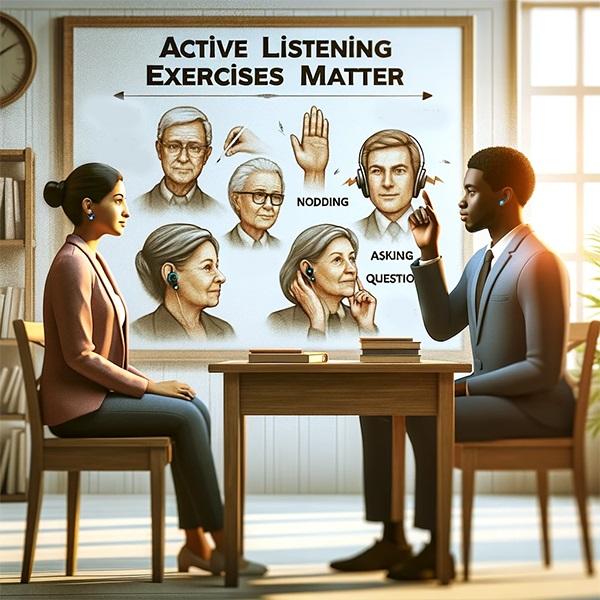Active listening is a crucial skill that plays a significant role in effective communication, building meaningful connections, and fostering trust in various personal and professional relationships. In this article, we will delve into the importance of active listening exercises, explore the benefits they offer, and provide practical tips for incorporating active listening techniques into your daily interactions.
Why Active Listening Exercises Matter
Active listening is more than just hearing the words spoken by another person; it involves fully engaging with the speaker, processing their message, and providing appropriate feedback to demonstrate attentiveness. This skill is essential in holding coaching conversations, as it creates a conducive environment for open and honest communication.
The Benefits of Active Listening
The importance of active listening cannot be overstated. It serves as a cornerstone for establishing trust between individuals, fostering empathy, and promoting psychological safety. By actively listening, asking thoughtful questions, seeking clarification, and encouraging others to share their perspectives, you can reinforce your role as a supportive spouse, friend, colleague, coach, or mentor. In a workplace setting, active listening can contribute to a sense of belonging and improved relationships among team members.
Coaching Effectiveness
Active listening also enhances your ability to coach others effectively. By being a strong and attentive listener, you inspire respect and trust from your co-workers and direct reports. This, in turn, can lead to improvements in professional relationships and overall team dynamics.
Personal and Professional Impact
As you begin to practice active listening, you will notice its positive impact in various aspects of your life. From personal relationships to professional interactions, active listening can improve communication, productivity, and your ability to influence, persuade, and negotiate. It also helps in conflict resolution and reduces misunderstandings, which are crucial for success in any workplace.
Top Tips for Active Listening
To be an effective active listener, it’s essential to employ specific techniques and approaches. Here are some key strategies to enhance your active listening skills:
1. Be Fully Present: In the fast-paced digital age, it’s important to be fully present in conversations, free from distractions such as notifications and emails. Give the speaker your undivided attention.
2. Non-Verbal Communication: Use non-verbal cues such as nodding, maintaining eye contact, and displaying open body language to show that you are actively engaged in the conversation.
3. Avoid Interruptions: Resist the urge to interject with comments or questions every time there is a pause in the conversation. Allow the speaker to express themselves fully before responding.
4. Reflective Responses: Provide reflective responses to demonstrate that you have understood the speaker’s message. This can include paraphrasing their words or summarizing their key points.
5. Ask Clarifying Questions: Seek clarification on any points that are unclear to ensure that you have a thorough understanding of the speaker’s perspective.
6. Mindful Listening: Practice mindful listening to maintain focus and avoid using active listening as a mere checklist of actions. Mindful listening involves being fully attentive and present in the moment.
The Necessity of Active Listening Skills
Active listening skills are necessary for building trust, understanding, and empathy in personal and professional relationships. It allows individuals to feel heard, valued, and respected, leading to stronger connections and more effective communication.
In a coaching context, active listening is essential for creating a safe and supportive space for individuals to express their thoughts, concerns, and aspirations. It enables coaches to gain a deeper understanding of their coachees’ perspectives, challenges, and goals, which is crucial for providing meaningful guidance and support.
In conclusion, active listening exercises matter because they form the foundation of effective communication, trust-building, and meaningful connections. By honing your active listening skills, you can enhance your personal and professional relationships, improve your coaching effectiveness, and contribute to a positive and inclusive work environment. Embracing active listening as a core skill can lead to greater success, both personally and within your professional endeavors.










